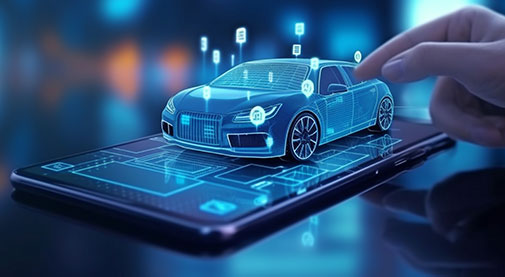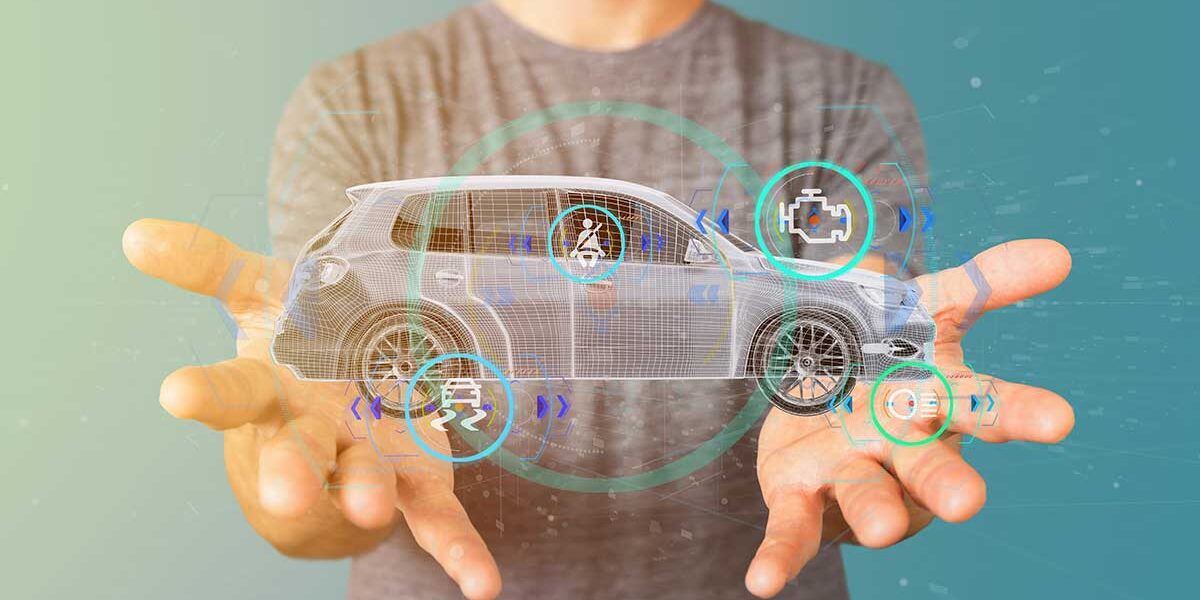Beyond manufacturing, Artificial Intelligence is poised to revolutionize the automotive industry’s research and design support functions. Recognizing the crucial role of AI applications, manufacturers are increasingly directing their efforts toward developing advanced AI solutions to meet the growing demand for autonomous vehicles.
In this context, we aim to explore the advantages and current status of AI implementation in the automotive industry. Let’s delve into some prominent use cases of AI that are shaping the present and future of the automotive sector.
AI solutions in Automotive
AI in the automotive industry refers to incorporating artificial intelligence techniques across various facets of the automotive sector. This integration involves utilizing diverse AI technologies, including machine learning (ML), natural language processing (NLP), and computer vision, to enhance the overall driver experience.
Applying these AI technologies in the automotive domain leads to the automation of numerous tasks such as route planning, navigation, and parking, ultimately resulting in increased efficiency and safety for drivers and passengers alike.
Why AI solutions in the Automotive Industry?
From design and manufacturing to production and post-production, the integration of AI in the automotive industry has already geared up — and there are many reasons why it can be the beginning of something exceptionally comfortable, safe, and fast. Read on to some key benefits of artificial intelligence in the automotive industry:
Improved Safety
With AI in automotive enabling advanced driver-assistance systems (ADAS), improved road safety looks promising. AI algorithms can analyze sensor data to identify potential dangers in real-time, which mitigates the risk of accidents. Automatic emergency braking and lane-keeping assist are features in AI automotive environments that lead to on-spot monitoring and safer driving experiences.
Autonomous Driving
Autonomous vehicles are the offering of AI, and self-driving cars have already garnered enough headlines. These cars use the integration of AI technologies that help understand the surroundings, practice quick decision-making, and drive around without human intervention. Call it a phenomenon or revolution; AI in automotive self-driving cars indicates fewer human errors, more organized traffic flow, and accessibility to individuals who cannot drive.
Improved Efficiency
AI in the automobile industry can minimize traffic congestion and optimize fuel efficiency. Driverless vehicles can help bring fuel economy down by 10%. Artificial intelligence algorithms analyze road conditions and traffic patterns to suggest the best vehicle routes, reducing fuel consumption and emissions. Moreover, AI-powered intelligent traffic management systems can control flow to manage congestion.
Use Cases of AI solutions in Autonomous Vehicles
Integrating various artificial intelligence techniques in the automotive industry has ushered in a new era of possibilities for automobiles. The applications of AI in autonomous vehicles are transforming the driving experience and shaping the future of the automotive sector. Here are some critical applications of AI in autonomous vehicles:
Advanced Driver Assistance Systems (ADAS)
AI is the backbone for various ADAS features, including lane-keeping assist, automatic emergency braking, adaptive cruise control, and parking assist. These systems utilize AI algorithms and sensors to continuously monitor the vehicle’s surroundings, identify potential hazards, and assist drivers in achieving collision-free driving, seamless parking, and more. For instance, the Telep ADAS Solution stands out by integrating over 20 cutting-edge AI models, significantly enhancing automotive safety and efficiency.
Autonomous Driving and Self-driving Cars
AI has gained significant recognition for introducing self-driving cars to the world. This technology employs machine learning algorithms, computer vision, and sensor fusion techniques to comprehend the vehicle’s environment. It enables real-time decision-making and comprehensive management of the car throughout the driving spectrum. Autonomous vehicles are poised to redefine transportation by enhancing road safety, reducing accidents, and optimizing traffic flow.
Sensor Fusion and Perception Systems
Sensor fusion involves collecting data from sensors like cameras, RADAR, LiDAR, and ultrasonic sensors. AI algorithms process and integrate this sensor data to understand the vehicle’s surroundings comprehensively. This enables the detection of objects and the prediction of their behavior, facilitating informed real-time decision-making. These systems activate advanced driver assistance features, including adaptive cruise control and pedestrian detection, contributing to an efficient and safe driving experience.
Path Planning and Navigation
AI is crucial in path planning and navigation, encompassing perception, localization, and collision avoidance. These components work together to optimize routes, ensuring efficient and safe navigation. AI-driven systems in this context contribute to enhanced route planning, considering real-time traffic conditions and potential obstacles.
The applications of AI solutions in autonomous vehicles are diverse and span critical aspects of driving, from safety features and collision prevention to optimized route planning and navigation. As technology advances, the automotive industry is set to witness further innovations, shaping a future where driving is more convenient, safer, and more efficient.

AI solutions in Vehicle Safety and Predictive Maintenance
Predictive analytics is pivotal in enhancing safety and decision-making across various industries, and the automotive sector is no exception. Integrating AI techniques is a comprehensive effort to bolster driver safety in the automotive realm.
Predictive Maintenance with AI solutions
AI significantly enhances predictive maintenance by analyzing data from vehicle sensors and systems. By identifying patterns and anomalies, AI algorithms predict potential failures or breakdowns, facilitating proactive prevention strategies. In the automotive industry, the aggressive use of AI optimizes maintenance schedules, reduces downtime, and enhances vehicle reliability, resulting in cost savings for vehicle owners and manufacturers.
Real-time Monitoring and Diagnostics
Predictive analytics-driven maintenance benefits car manufacturers and owners by providing timely alerts about potential technical risks. This allows customers to receive alerts and directly communicate with manufacturers for maintenance, streamlining the process compared to traditional repair shops.
Safety and Risk Assessment
In the automotive industry, artificial intelligence contributes to worry-free journeys by issuing alerts about potential dangers on specific routes. AI solutions also aid in tasks such as parking and reversing, further enhancing overall safety for drivers and passengers.
AI-Enabled Customer Experience
AI’s role in the automotive industry extends to improving the overall customer experience. From driving to interactions between drivers and vehicles, AI technology is employed for personalization, ensuring a seamless and effortless driving experience.
Personalized Driving Experience
AI enhances the user experience by incorporating technologies like natural language processing and voice recognition, facilitating smooth interactions between humans and machines. Voice-activated controls allow drivers and passengers to manage various functions through voice commands. AI-enabled virtual assistants offer personalized recommendations, real-time information, and a hassle-free driving experience.
Voice Recognition and Natural Language Processing
While some industry players utilize third-party personal assistants, certain automotive companies have opted for their voice-recognition systems. These systems can adjust settings, provide information about fuel or gas, make calls, and change radio stations. The high level of personalization enables these assistants to remember driver preferences and suggest adjustments based on context and user history.
In-car Virtual Assistants
In-car virtual assistants, powered by natural language processing, have revolutionized the industry by introducing voice-controlled assistance and connectivity solutions. These intelligent systems allow drivers and passengers to interact seamlessly with their vehicles through audio commands.
AI solutions in Manufacturing and Supply Chain
The automotive industry involves complex processes from vehicle manufacturing to component management. AI and its various technologies are crucial in addressing efficiency, cost, and other challenges by automating and streamlining diverse processes.
Robotics and Automation
Robotics and automation are particularly beneficial in vehicle manufacturing, providing efficiency, precision, and cost-effectiveness. These technologies help prevent harm to humans and identify irregularities in material parts, contributing to a streamlined manufacturing process.
Quality Control and Defect Detection
AI-powered data annotation aids the manufacturing industry in identifying and addressing issues, regardless of their severity. This results in cost-effectiveness by resolving matters initially, preventing incomplete or faulty outcomes.
Supply Chain Optimization
AI and machine learning assist automotive managers in systematically managing the supply chain. This technology ensures the efficient monitoring of components throughout every stage, addressing the challenges faced in the supply chain industry.
AI solutions for Smart Traffic Management
Intelligent traffic management is critical in the AI automotive landscape, poised for transformation with emerging technologies like IoT. Several features highlight the potential changes in this domain.
Traffic Prediction and Optimization
AI-enabled traffic management systems analyze data to optimize traffic flow and minimize real-time congestion. From suggesting optimal and safe routes to coordinating traffic signals based on accurate data predictions, AI reduces travel time, enhances road capacity, and improves overall transportation management.
Intelligent Transportation Systems (ITS)
Intelligent Transportation Systems (ITS) utilize advanced AI solutions to boost transportation efficiency, safety, and sustainability. These systems leverage data analytics, sensors, and real-time communication to provide actionable insights, aiding transportation authorities and users in decision-making. Applications of ITS include traffic signal control, adaptive cruise control, and vehicle-to-vehicle communication, widely employed in intelligent road infrastructures.
Connected Vehicle Technologies
The growth of IoT, combined with 5G and cloud computing, establishes connectivity between vehicles, smartphones, and infrastructures. This connectivity enhances safety and efficiency in autonomous driving, showcasing the potential of integrated technologies in shaping the future of transportation.
Bottom Line
The future of AI in the automotive industry is poised for significant growth, with automation being a prevalent buzzword in recent years. The global adoption of AI solutions in the automotive sector is steadily increasing, and automobile manufacturers worldwide are incorporating AI into every facet of the vehicle manufacturing process. Integrating AI and machine learning is paving the way for the safe navigation of autonomous vehicles through traffic.
In autonomous driving, the convergence of AI with cloud computing, IoT, machine learning, deep learning, and cognitive systems is expected to bring forth a new era of safe and efficient autonomous vehicles. Furthermore, the rise of AI-powered smart automotive manufacturing is anticipated to surge with technological advancements.
While AI robots have yet to take over manufacturing operations completely, the next decade is expected to witness a comprehensive shift toward their dominance. The growing prominence of AI use cases in the automotive industry indicates a transformative future. The figure illustrates the trajectory of AI development and deployment in the automotive industry from 2015 to the projected trends in 2030.
As evident from the figure, the future of the automotive industry will be intricately intertwined with AI. Considering various AI trends in the automotive sector, self-driving vehicles are anticipated to become commonplace on the streets by 2030. Research reports suggest that global sales of self-driving systems are projected to reach an impressive 80 million units by 2032, up from 33 million in 2019. This substantial growth rate promises to create lucrative opportunities for intelligent automobile manufacturers.
To gauge the penetration of autonomous vehicles, one can observe their projected market share by 2030, as indicated in the figure below. This data underscores the transformative impact of AI solutions on the automotive industry, shaping a future where autonomous vehicles are not just a possibility but a reality set to revolutionize the way we experience transportation.



